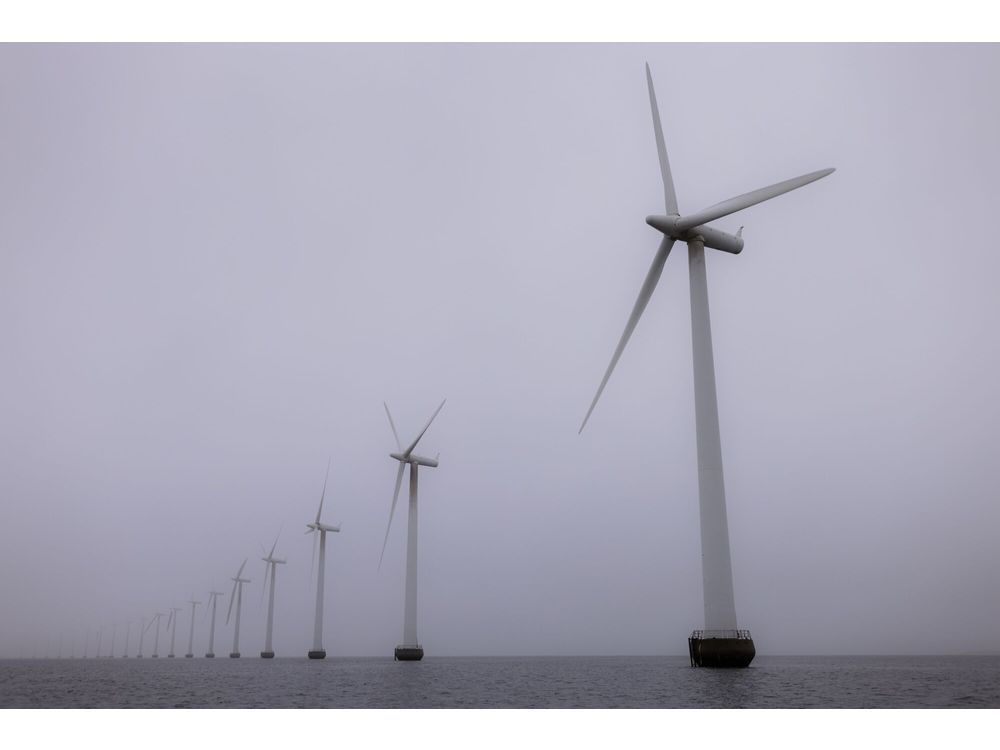Business
Mitsubishi Exits Three Offshore Wind Projects in Japan, Impacting Energy Goals

A consortium led by Mitsubishi Corp. has withdrawn from three offshore wind projects in Japan, marking a significant setback for the country’s renewable energy ambitions. This decision underscores the challenges the global offshore wind sector faces, as the company cited “tight supply chains, inflation, exchange rates, and rising interest rates” as primary factors influencing their decision. The announcement was made on Wednesday, highlighting the shifting landscape for offshore wind since the consortium secured the project sites in a government tender in 2021.
Japan’s nascent offshore wind industry has been under pressure, and this latest withdrawal raises concerns about the country’s ability to meet its energy transition and climate goals. According to Umer Sadiq, a Japan analyst at BloombergNEF, the country was already on a trajectory to miss its 2030 renewable energy targets, and this development is likely to push it further off course. He noted that uncertainties surrounding the restart of nuclear power facilities could lead Japan to rely more heavily on liquefied natural gas and coal, making its energy mix more carbon-intensive than initially planned.
The implications of Mitsubishi’s exit extend beyond just financial losses. The company reported a loss of 52.2 billion yen (approximately $352 million) related to its domestic offshore wind business in February when it first announced a review of the projects. Chubu Electric, another partner in the consortium, anticipates a charge of 17 billion yen as a result of this withdrawal. Despite these losses, Chubu Electric stated that it would not revise its full-year financial forecast.
This withdrawal from the wind projects reflects broader trends in the industry, which has faced cost overruns and regulatory challenges. The situation in Japan has been compounded by strong opposition to renewable energy projects from various political factions, which recently culminated in the abrupt halt of an almost complete project in the United States under the administration of former President Donald Trump.
As Japan navigates these challenges, the viability of its energy transition remains precarious. The country has long relied on fossil fuels to meet its energy needs, and this latest setback could further complicate efforts to decarbonize its economy. With the risks surrounding energy security and climate commitments now heightened, stakeholders will closely monitor how Japan adapts its energy strategy in the coming months.
-

 Education3 months ago
Education3 months agoBrandon University’s Failed $5 Million Project Sparks Oversight Review
-

 Science4 months ago
Science4 months agoMicrosoft Confirms U.S. Law Overrules Canadian Data Sovereignty
-

 Lifestyle3 months ago
Lifestyle3 months agoWinnipeg Celebrates Culinary Creativity During Le Burger Week 2025
-

 Health4 months ago
Health4 months agoMontreal’s Groupe Marcelle Leads Canadian Cosmetic Industry Growth
-

 Science4 months ago
Science4 months agoTech Innovator Amandipp Singh Transforms Hiring for Disabled
-

 Technology3 months ago
Technology3 months agoDragon Ball: Sparking! Zero Launching on Switch and Switch 2 This November
-

 Education3 months ago
Education3 months agoRed River College Launches New Programs to Address Industry Needs
-

 Technology4 months ago
Technology4 months agoGoogle Pixel 10 Pro Fold Specs Unveiled Ahead of Launch
-

 Business3 months ago
Business3 months agoRocket Lab Reports Strong Q2 2025 Revenue Growth and Future Plans
-

 Technology2 months ago
Technology2 months agoDiscord Faces Serious Security Breach Affecting Millions
-

 Education3 months ago
Education3 months agoAlberta Teachers’ Strike: Potential Impacts on Students and Families
-

 Science3 months ago
Science3 months agoChina’s Wukong Spacesuit Sets New Standard for AI in Space
-

 Education3 months ago
Education3 months agoNew SĆIȺNEW̱ SṮEȽIṮḴEȽ Elementary Opens in Langford for 2025/2026 Year
-

 Technology4 months ago
Technology4 months agoWorld of Warcraft Players Buzz Over 19-Quest Bee Challenge
-

 Business4 months ago
Business4 months agoNew Estimates Reveal ChatGPT-5 Energy Use Could Soar
-

 Business3 months ago
Business3 months agoDawson City Residents Rally Around Buy Canadian Movement
-

 Technology2 months ago
Technology2 months agoHuawei MatePad 12X Redefines Tablet Experience for Professionals
-

 Business3 months ago
Business3 months agoBNA Brewing to Open New Bowling Alley in Downtown Penticton
-

 Technology4 months ago
Technology4 months agoFuture Entertainment Launches DDoD with Gameplay Trailer Showcase
-

 Technology4 months ago
Technology4 months agoGlobal Launch of Ragnarok M: Classic Set for September 3, 2025
-

 Technology4 months ago
Technology4 months agoInnovative 140W GaN Travel Adapter Combines Power and Convenience
-

 Science4 months ago
Science4 months agoXi Labs Innovates with New AI Operating System Set for 2025 Launch
-

 Technology4 months ago
Technology4 months agoNew IDR01 Smart Ring Offers Advanced Sports Tracking for $169
-

 Top Stories2 months ago
Top Stories2 months agoBlue Jays Shift José Berríos to Bullpen Ahead of Playoffs










